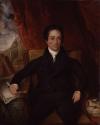To the Editor [of the "London Magazine"]
Mr. Editor,-The riddling lines which I send you, were written upon a young lady who, from her diverting sportiveness in childhood, was named by her friends The Ape. When the verses were written, L. M. had outgrown the title-but not the memory of it-being in her teens, and consequently past child-tricks. They are an endeavour to express that perplexity which one feels at any alteration, even supposed for the better, in a beloved object; with a little oblique grudging at Time, who cannot bestow new graces without taking away some portion of the older ones, which we can ill miss.
An Ape is but a trivial beast,
Men count it light and vain;
But I would let them have their thoughts,
To have my Ape again.
To love a beast in any sort
Is no great sign of grace;
But I have loved a flouting Ape's
'Bove any lady's face.
I have known the power of two fair eyes,
In smile or else in glance,
And how (for I a lover was)
They make the spirits dance;
But I would give two hundred smiles
Of them that fairest be,
For one look of my staring Ape
That used to stare on me.
This beast, this Ape, it had a face-
If face it might be styled-
Sometimes it was a staring Ape,
Sometimes a beauteous child-
A Negro flat-a Pagod squat,
Cast in a Chinese mould-
And then it was a Cherub's face
Made of the beaten gold!
But Time, that's meddling, meddling still,
And always altering things-
And what's already at the best
To alteration brings,
That turns the sweetest buds to flowers,
And chops and changes toys,
That breaks up dreams, and parts old friends,
And still commutes our joys-
Has changed away my Ape at last
And in its place conveyed,
Thinking therewith to cheat my sight,
A fresh and blooming maid!
And fair to sight is she-and still
Each day doth sightlier grow,
Upon the ruins of the Ape,
My ancient playfellow!
The tale of Sphinx, and Theban jests
I true in me perceive;
I suffer riddles; death from dark
Enigmas I receive:
Whilst a hid being I pursue,
That lurks in a new shape,
My darling in herself I miss,
And, in my ape, the ape.
1806.






